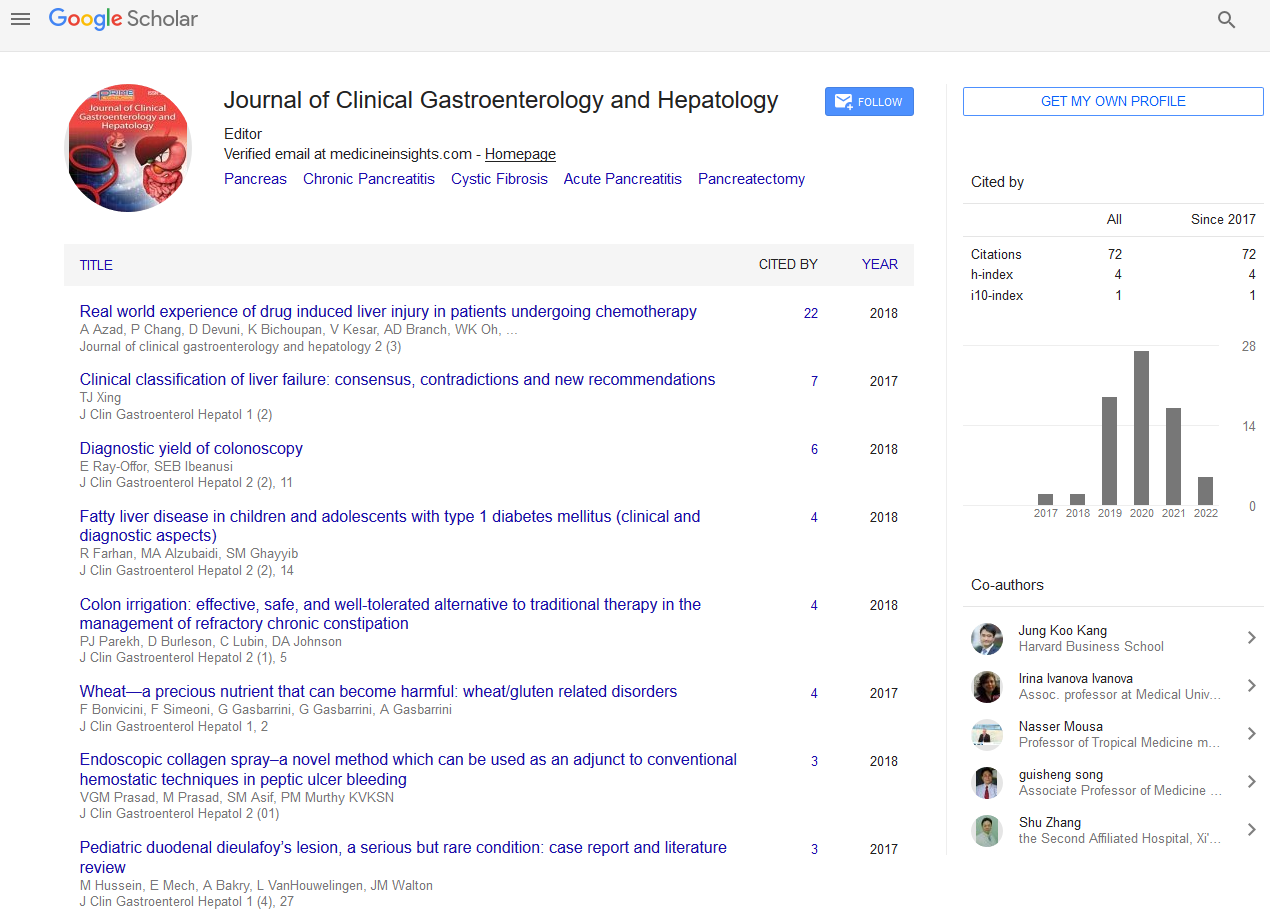Editorial - (2021) Volume 5, Issue 4
A Short Note on Vocal Cord Paralysis, Cystic Fibrosis and its Causes
Vega Fatme*
Department of Gastroenterology, Taif University, Taif, Saudi Arabia
*Correspondence:
Vega Fatme, Department of Gastroenterology, Taif University, Taif,
Saudi Arabia,
Email:
Received: 10-Dec-2021
Published:
31-Dec-2021
Description
Vocal cord paralysis occurs when the nerve impulse to the
voice box (larynx) is interrupted. This leads to paralysis of the
vocal cord muscles. Vocal cord paralysis can affect your ability to
speak and breathe. This is because the vocal cords (sometimes
called vocal cords) do more than just make sounds. It also
protects the airways by preventing food, drink, and even saliva
from entering the trachea and choking. Possible causes include
nerve damage during surgery, viral infections, and certain types
of cancer. Treatment of vocal cord paralysis usually includes
surgery and, in some cases, voice therapy.
The vocal cords are two flexible muscular tissue bands at the
entrance of the trachea (trachea). When you speak, the bands
come together and vibrate to make a sound. For the rest of the
time, you will be able to relax and breathe with your vocal cords
open. In most cases of vocal cord paralysis, only one vocal cord
is paralyzed. Paralysis of both vocal cords is rare but serious. This
can cause difficulty speaking and serious breathing and
swallowing problems. Signs and symptoms of vocal cord
paralysis include breathing, hoarseness, wheezing, loss of vocal
pitch, choking or coughing while swallowing food, drink or
saliva, etc. Vocal cord paralysis disrupts nerve impulses to the
larynx (larynx), leading to muscle paralysis.
Cystic Fibrosis
Cystic Fibrosis (CF) is a genetic disorder that causes serious
damage to the lungs, digestive system, and other organs in the
body. Cystic fibrosis is a common autosomal recessive disorder
with severe respiratory symptoms such as shortness of breath
and chronic cough. Most treatments for cystic fibrosis aim to
reduce the effects of the disease, but patients with cystic
fibrosis also exhibit abnormal symptoms and respiratory
problems. Patients with cystic fibrosis had significantly reduced
voice intensity and harmonic noise ratios, and increased levels
of jitter and fibrillation. In addition, CF patients also had higher
scores for roughness, shortness of breath, and asthenia, with
significant changes in the overall grade of dyspnoea. There is no
therapy for cystic fibrosis, however remedy can ease symptoms,
less headaches and enhance first-class of life. Managing cystic
fibrosis is complex, so do not forget getting remedy at the middle with a multispecialty group of doctors and scientific
specialists educated in CF to assess and deal with the condition.
Cystic fibrosis signs and symptoms vary, depending on the
severity of the disease. Even in the same person, symptoms may
worsen or improve as time passes. Some people may not
experience symptoms until their teenage years or adulthood.
People who are not diagnosed until adulthood usually present
with mild illness and more atypical symptoms such as recurring
bouts of an inflamed pancreas (pancreatitis), infertility and
recurring pneumonia.
Cardiovascular disorder is known to cause vocal cord
paralysis, likely through mechanical harm to the recurrent
laryngeal nerve. Pulmonary arterial high blood pressure and
dilation arise as much as 80% of patients with cystic fibrosis. The
path of the left recurrent laryngeal nerve through the chest
brings the chest towards the coronary heart and the massive
blood vessels of the coronary heart. The sudden dilation of the
pulmonary artery induced recurrent laryngeal nerve harm and
vocal wire paralysis. This is simply the second one hyperlink
among unilateral vocal wire paralysis and cystic fibrosis in the
clinical literature. The course of the left recurrent laryngeal
nerve through the chest brings the chest closer to the heart and
the large blood vessels of the heart. Cardiovascular disease is
known to cause vocal cord paralysis, probably through
mechanical damage to the recurrent laryngeal nerve. Pulmonary
arterial hypertension and dilation occur in up to 80% of patients
with cystic fibrosis.
Causes
In cystic fibrosis, a defect (mutation) in a gene called the
Cystic Fibrosis Transmembrane Conductance Regulator (CFTR)
gene alters proteins that regulate the movement of salts inside
and outside the cell. As a result, the mucus of the respiratory,
digestive and genital organs becomes thicker and the salt level
of sweat increases. Various defects can occur in genes. The type
of gene mutation is associated with the severity of the disease.
Children must inherit one copy of the gene from each parent in
order to get sick. If the child inherits only one copy, they do not
develop cystic fibrosis. However, they can become carriers and
pass genes to their children.
Citation: Fatme V (2021) A Short Note on Vocal Cord Paralysis, Cystic Fibrosis and its Causes. J Clin Gastroenterol Hepatol Vol.5 No.4:e005.
Copyright: This is an open access article distributed under the terms of the Creative Commons Attribution License, which permits unrestricted use, distribution, and reproduction in any medium, provided the original work is properly cited.

